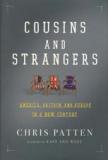On the State of World Affairs
When Europeans criticize President George W. Bush’s foreign policy, they often cite the predominance of (neo-) conservative and religious thinking. A book written by a British politician who defines himself as a conservative, a Catholic and a patriot ought thus to offer some hope for the transatlantic relationship. In fact, Cousins and Strangers shows how the conservatism of the current administration is built from timber grown in a very different part of the forest than that of European conservatives.
Chris Patten is uniquely qualified to comment on world affairs. A rising star under Margaret Thatcher in the 1980’s, he was a British government minister until 1992, when he masterminded a historic fourth consecutive election win for the Conservative Party but lost his own parliamentary seat. He was then dispatched to Hong Kong as the last British governor before the colony was returned to China in 1997, giving him a ringside seat for the Red Dragon’s transformation into an economic powerhouse. From 1999 to 2004 he served on the European Commission in Brussels, responsible for the European Union executive’s relations with the rest of the world.
This memoir-cum-manifesto was first published in the United Kingdom last year as Not Quite the Diplomat: Home Truths About World Affairs, though its true objective becomes clearer in the title of this revised American edition: a plea from a long and close friend for the United States to mend its ways, avoid the hubris of empire and rediscover its role as the champion of international justice.
Patten’s sketches of statesmen at work are gems, like the image of President Jacques Chirac of France at a European summit deep in contemplation of a pile of sale-room catalogs for Asian artifacts. Yet his recollections about world leaders, while often revealing, take second place to his critique of U.S. foreign policy. His sympathies are clear: Colin Powell is a marvelously reassuring figure, knowledgeable, articulate, and charming. Dick Cheney, on the other hand, provokes unadulterated contempt: It is usually easier in politics if you dislike the person as well as his ideas.
The argument behind Cousins and Strangers is that Vice-President Cheney’s New America, obsessed with defending the perceived national interest by hard power, has ignored how much Powell’s Old America achieved in the last half-century through the judicious use of soft power. As British environment secretary during the 1980’s, Patten was an eyewitness to Old America under Bush the Elder applying such soft power to bring about the first international agreements on the environment. Ever erudite, he uses the analogy of the Athenians’ bullying the Melians in the Peloponnesian War to warn that if the United States wields its hard-power club too freely, it will eventually rebound with disastrous consequences.
His criticism is also aimed at European leaders like Tony Blair, who claim to adhere to more liberal values but have done little to make their case: I often wondered how our British, and European, failure to speak out more eloquently on the Middle East and related issues must have undermined the position in Washington of Colin Powell and other sensible moderates.
Patten’s analysis is eloquent and, argued from an Atlanticist, conservative perspective, avoids the hyperbole of much European debate on America’s role in the world. There is a risk, though, that the evident failures of today’s foreign policy cause us to view yesteryear’s with rose-tinted spectacles. Take the Fourteen Points of President Woodrow Wilson, to which Patten alludes with approval. While they (like today’s Freedom Agenda) were admirable in sentiment, neither Wilson’s British and French imperialist allies nor the isolationist Congress paid more than lip service to them (which might also be said of today’s U.S. allies in the Middle East and Central Asia). The hopes Wilson raised among ordinary Germans made the unduly harsh terms of the ensuing Versailles Treaty a bitter betrayal, setting the scene for the rise of the Nazi Party. The only consolation, perhaps, is that Bush’s words are taken less seriously than Wilson’s were.
One subject on which it would be good to hear Patten say more is the role of religion in public life, which he identifies as central to Europe’s future relations with both the United States and the Islamic world. In particular, it would be interesting to know more about his views on his own Catholic faith, to which he draws attention several times and which was a key feature when he was appointed to chair the commission that reformed Northern Ireland’s police service, a traditionally Protestant bastion, following the Good Friday peace agreement in 1998. He is a convinced supporter of European integration based on the pooling of sovereignty and the principle of subsidiarity, ideas rooted in Catholic social teaching. In his view, though, the encyclical Quadragesimo Anno, in which Pope Pius XI set out the principle (that decisions should be taken by the lowest competent authority), was merely an attempt to maintain church authority against state encroachment. Indeed, he sums up Catholic social teaching in general as mixing waffling, well-meaning, and incompatible aims with a dirigiste instinct. This will surely disappoint defenders of the church’s engagement in European public life, who point to this philosophical influence as evidence of Europe’s living Christian heritage.
It is to be hoped that Patten will return to this critique of the churchand of religion’s role in public life in generalwith the same spirit he has applied to the United States in Cousins and Strangers: that of the true friend willing to point out flaws.
This article also appeared in print, under the headline “On the State of World Affairs,” in the August 14, 2006, issue.








